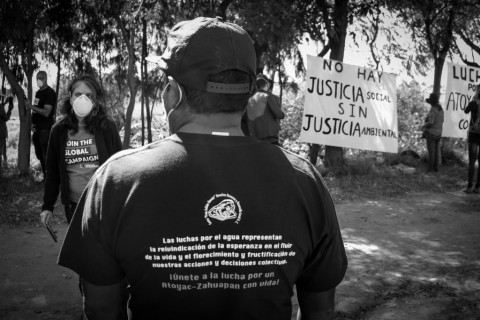Ideas into movement
Boost TNI's work
50 years. Hundreds of social struggles. Countless ideas turned into movement.
Support us as we celebrate our 50th anniversary in 2024.

“Electricity should be owned by the people”, declared Bernd Lange, the chair of the European Parliament's Committee on International Trade (INTA), during a recent visit to the Mexican Senate. But this should also apply to other energy and natural resources. The “modernization” of the Free Trade Agreement between the European Union and Mexico raises great concerns, because it may result in a greater surrender of sovereignty and shows many shortcomings in environmental protection.

During a discussion held with Lange and INTA’s parliamentarian delegation on February 23, Mexican civil society organizations explained that the sustainability of business projects can only be reached through the respect of human and environmental rights. Yet, many European companies in Mexico totally bulldoze those issues, as revealed by the report “Unmasked: Corporate Rights in the Renewed Mexico-EU FTA”. Representatives of Peace Brigades International (PBI), Servicios y Asesoría para la Paz (Serapaz) and the Project on Organization, Development, Education and Research (PODER), presented the positions developed by social and civil organizations since the EU-Mexico FTA was first negotiated and signed in 2000, also known in Spanish by its acronym TLCUEM.
It was a timely meeting , considering that the negotiations of the reconditioned TLCUEM are claimed to have ended in 2020, following an “agreement in principle” in 2018, and some texts were released but remained available only in English to this day. Even though the final texts are not public, governments intend to have them ratified soon by the Mexican Senate, the European Parliament and the parliaments of the EU Member States in order to bring the new FTA definitively into force.
PBI, Serapaz and PODER delivered to the MEPs a document that contextualizes the presidential decree in Mexico that gives preference to certain projects with European capital, showing how it creates the conditions for multiple human rights abuses and tramples on citizen and indigenous consultation processes, in violation of Agreement 169 of the International Labor Organization (ILO). The document also exposes why “the global agreement [with the EU] is not an adequate formula to bring companies to comply with due diligence in human rights, [denouncing] that the previous agreement contained a democratic clause which was never activated despite Mexico’s serious human rights crisis”. While Mexico has subscribed to ILO’s Convention 169, only five of the 27 EU Member States have ratified it, leading the EU to refuse to bound its trade relations to popular consent and consultations.
The organizations also insisted on the impact of the “multi-million dollar commercial claims filed by investors against Mexico and how they cost vital resources to the government, affecting its role in guaranteeing the population’s economic, social, cultural and environmental rights”. Indeed, Mexico has already been sanctioned to pay foreign companies more than 500 million dollars and is currently sued at the World Bank for at least an additional 6 billion dollars, and probably much more. Ivette González, from PODER, commented that the European parliamentarians, despite “their apparent open mindedness, did not react or comment on this issue”.
Gaby Küppers, former advisor to the Greens at the European Parliament, a party that did not take part in this delegation to Mexico, just like the United Left, believes that the parliamentarians “not responding to the investment issue is problematic. For them it is a taboo. They are unconditional supporters of mechanisms that allow foreign investors to sue states if new laws or regulations diminish their gains or their expectation of profits. This leads to a chilling effect on governments making them abandon their social or environmental policies”. She added that “politicians are politicians. As Members of the European Parliament, they believe their role is to create conditions that benefit companies and not to intervene in the current economic model”. She is referring, of course, to the parties represented in the parliamentary delegation to Mexico. And she adds that many MEPs also “see the possibility of becoming entrepreneurs one day. How better can it be not to have to stumble on tedious regulations!”
The government of Andrés Manuel López Obrador has the option to stall the new EU-Mexico FTA ratification. The European Commission is looking for a three-parts ratification process–trade, investment, and political cooperation–with the goal of bringing the trade stream into force preliminarily as soon as it is approved by the European Parliament and the EU Council, well aware that the sections on investment and policy and cooperation need to be approved by the national parliaments, a process that tends to be lengthy and with greater risks of being derailed. Mexico has been reluctant to split the agreement, thinking this would give less weight to the political part.
What is most urgent at this stage is that the Mexican Senate studies the texts of the treaty thoroughly and opens spaces of public debate with different social sectors before ratifying it. In the face of more than 25 years of failed trade policies, Mexico cannot afford to follow the same old path, one that, far from bringing benefits to the population as a whole, has led to the loss of millions of jobs and the destruction of territories and livelihoods as well as some of the country’s key economic sectors. The AMLO government must call the EU to a new round of negotiations, aiming for an agreement focused on peoples’ welfare, environment protection and human rights. With Europe, no more mirrors for gold!